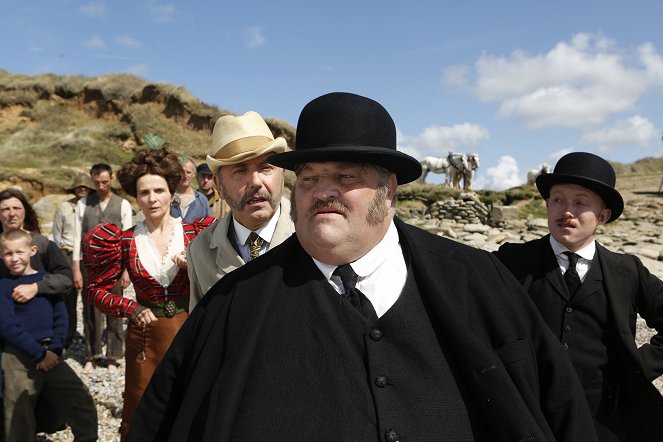Regie:
Bruno DumontDrehbuch:
Bruno DumontKamera:
Guillaume DeffontainesBesetzung:
Juliette Binoche, Valeria Bruni Tedeschi, Fabrice Luchini, Jean-Luc Vincent, Didier Desprès, Cyril Rigaux, Brandon Lavieville, Raph, Lauréna ThellierStreaming (1)
Inhalte(1)
Im Sommer 1910 geht Seltsames vor sich an der französischen Normandieküste. Alljährlich findet sich hier der Landadel ein, denn die Luft ist heilsam und die armen Fischer und verlumpten Muschelsammler sind herrlich pittoresk. Doch dieses Jahr ist etwas anders: zahlreiche Sommerfrischler sind spurlos verschwunden und haben das bizarre Polizistenduo Böswald und Blading auf den Plan gerufen. Schnell deuten die Zeichen auf den Fischer Rohbrecht, der stets hungrig wirkt und den man in der Gegend respektvoll den „Ewigen" nennt. Mit seinem kantigen Sohn Lümmel verdient er sich ein Zubrot, indem er wohlhabende Touristen über die ewigen Gewässer befördert. So auch die Töchter der Familie van Peteghem, deren herrschaftliches Anwesen in aller gebotenen Dekadenz über der Bucht thront. Dabei verlieben sich Lümmel und die schöne Billie van Peteghem und zwingen Distinguierte und Depravierte in einen allzu plötzlichen Familien-Kontakt. Während die Polizisten ratlos durch eine groteske Dünenlandschaft voller Nymphomanen, Nudisten und Narzissten pflügen, drängt sich ein entsetzlicher Verdacht auf. Plötzlich verschwindet auch Billie van Peteghem und die Ordnungshüter müssen befürchten, dass die Rohbrechts nicht nur Muscheln, sondern auch Menschen sammeln. (Neue Visionen)
(mehr)Videos (4)
Kritiken (3)
Der zweite Aufguss von "P'tit Quinquin". Dumonts ostentative Vorliebe für die Dialektik der Entartung der Bourgeoisie und der Arbeiter führt zu einer allmählichen Entartung seiner Poetik. Luchini ist großartig, Binoche ist schrecklich, gut fürs Televarieté. Ein Film, den ich eher mit einem Lächeln ertragen als genossen habe. [Cannes 2016]
()
My second encounter with Bruno Dumont also didn't go well. It was to such an extent that it was most likely the last. As a construct, I didn't accept his script at all. Slack Bay has at least decent poetics, great camera work, and excellent casting. It's just a pity that it's so shallow and goes nowhere. For about three-quarters of the film, I thought I was watching a 3-star film, but in the final part, I felt tired from the constant overacting and grimaces, and the ending that seemed to go nowhere decided about 40% of my overall impression. You can enjoy Slack Bay the more you don't take it seriously and give up on searching for any allegories and deeper meanings. It's actually a slapstick about how egalitarian France distributes degeneration democratically among elites and the proletariat. While Fabrice Luchini portrayed his degenerate with cuteness, Juliette Binoche played such a self-centered and affected bitch that you would hardly find an equal in the film world. I was impressed by the young Raph, I can see her potential, which would be a shame to waste. Slack Bay is one of those films where everyone certainly had a great time on set, but the reactions in the movie theater will, in my opinion, differ radically. This film will definitely divide the audience in a very significant way.
()
Whereas in Li’l Quinquin Dumont took the genre of police procedurals to task and subjected it to a deconstruction of baseness and dementedness, this time he took aim at delicate midcult costume dramas. This is connected with the deviation from realism that is associated with Dumont and was rejected and misunderstood by most viewers. While police series play on realism and Dumont’s absolutism laid the foundation of his previous project’s subversiveness, there is no realism to be found anywhere in Slack Bay, as the genre does not work with it at all. The film’s subversiveness thus derives from a caricature that emphasises certain features of the target on which Dumont sets his sights. Though Slack Bay is descended from a line of French costume dramas, it has a perfect reference point in the British television hit Downton Abbey, a moving melodrama about empathetic members of the upper class and the servants who love their lordship above all else that wallows in its sumptuous high-mindedness, while allowing viewers to dream dreams about love bridging social chasms and to experience an emotionally extortionate drama in which criminal motives intrude on the idyll. Dumont flawlessly follows these outlines, but he boldly and vulgarly disparages the aforementioned caricature. The upper crust is thus composed of degenerates, retards, psychopaths and inbreds, while the servants merely live off of them, literally. It’s not so hot with love either, since even the most likable character from the ranks of the nobs still has a deformed core. Dumont even recalls miraculous plot twists and moving exteriors that essentially belong to Downton Abbey. An excellent aspect of his variation on Downton is the casting of the cream of grimacing acting greats led by the marvellously and hysterically hen-like Juliette Binoche (those who find her performance inadequate have never seen Elizabeth McGovern’s unbearably obtrusive facial expression in Downton) and setting against them Dumont’s typically asocial non-actors with their bizarre ticks and unique faces. Fans of Dumont as the masterful great of festival films will be very disillusioned with Slack Bay, because instead of a weighty epic, they will get an iconoclastically sophisticated farce that inclines more toward the splendidly demented faecal-humour of the creative duo Christian Clavier and Jean-Marie Poir than toward the laurels won at Cannes. Could it be that with advancing age, Dumont would follow the career trajectory of Takeshi Kitano, who one day also recognised that he’d had enough of the foolishness on the red carpet and began purposefully attacking his audience with absurd freaks of the coarsest grain? If so, keep it up!
()



Werbung